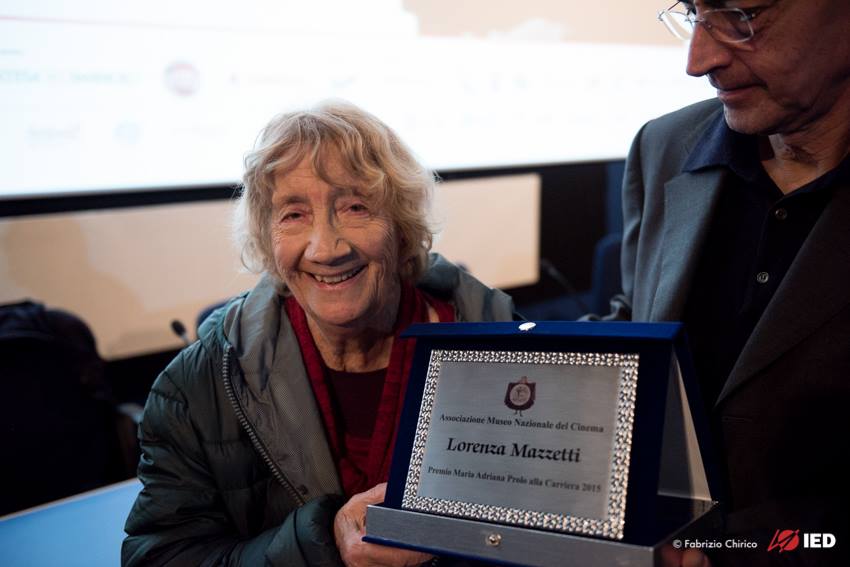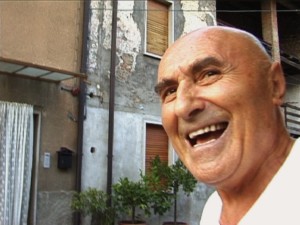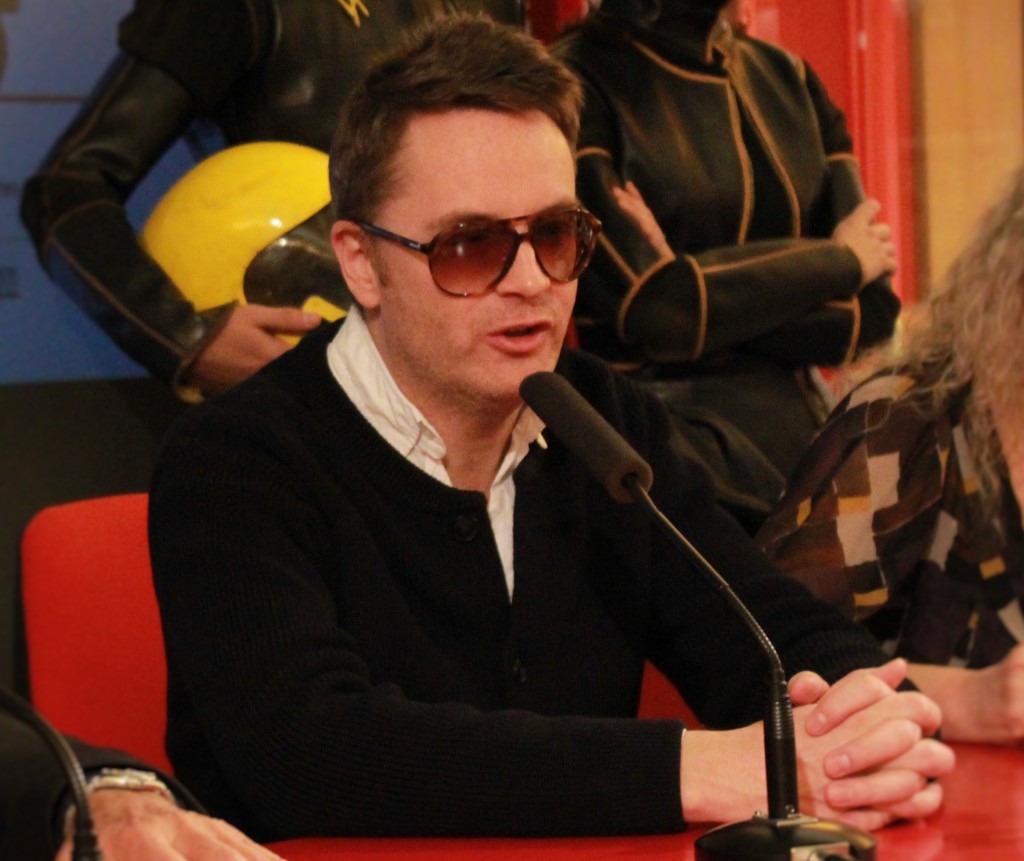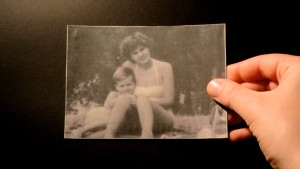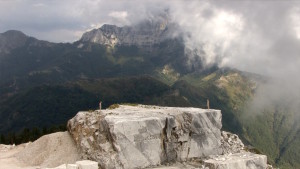Quando la si vede dietro il grande tavolo rosso delle conferenze stampa, un po’ piccolina tra Stefano “Steve” Della Casa e David Grieco, non si può fare a meno di pensare a tutte le vite vissute da Lorenza Mazzetti. Se le porta dietro e addosso: un basco nero appoggiato sui capelli ribelli, il taglio degli occhi disegnato all’ingiù, la voce calma e quel suo modo magnetico di raccontarsi e farci stare incollati alle sedie senza perdere nemmeno una parola.
“Io le cose ve le dico, ma sarebbe meglio che leggeste Diario londinese, il mio ultimo libro”.
Ironica, scanzonata, anticonformista. Non è cambiata molto dal 1956, quando firmava il manifesto del Free Cinema insieme a Lindsay Anderson, Karel Reisz e Tony Richardson.
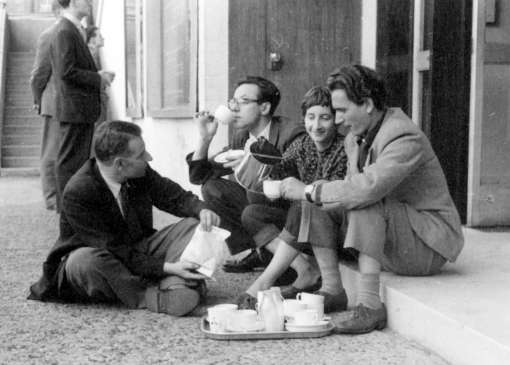 La sua è una bella storia che inizia in un locale in centro a Londra, quando Lorenza era una cameriera dalla lingua svelta che voleva iscriversi alla Slade School of Fine Art senza un soldo, né i moduli necessari. La segretaria la cacciò, lei iniziò ad urlare e da una delle porte uscì “un uomo in bretelle, probabilmente un inserviente che chiese cosa stava succedendo. ‘Io voglio venire qui ad imparare, a dipingere, a lavorare!’ gli dissi. ‘Ma perché proprio qui?’ ‘Perché sono un genio!’ Non sapevo che altro dirgli.”
La sua è una bella storia che inizia in un locale in centro a Londra, quando Lorenza era una cameriera dalla lingua svelta che voleva iscriversi alla Slade School of Fine Art senza un soldo, né i moduli necessari. La segretaria la cacciò, lei iniziò ad urlare e da una delle porte uscì “un uomo in bretelle, probabilmente un inserviente che chiese cosa stava succedendo. ‘Io voglio venire qui ad imparare, a dipingere, a lavorare!’ gli dissi. ‘Ma perché proprio qui?’ ‘Perché sono un genio!’ Non sapevo che altro dirgli.”
Il signore le dà dei moduli da compilare dei fogli e le dice di presentarsi la mattina seguente.
“Io ero anche un po’ perplessa e gli ho chiesto: “Ma cosa dirà il direttore?” “Niente, perché il direttore sono io!” Insomma, aveva le bretelle ed era in maniche di camicia e gli spiegai che in Italia il direttore di un’università non si sarebbe mai presentato senza la giacca. Non avrebbe nemmeno mai ammesso una ragazzina senza soldi che viene qui senza firmare nessun modulo e pretende di essere un genio! Ecco, capite? Non ho potuto fare a meno di innamorarmi di quest’uomo!”
Così, Lorenza inizia a frequentare l’università, si annoia un po’ a dipingere e preferisce gironzolare nei corridoi fino a quando si trova davanti alla porta del Film Club. La spinge, entra e vede “luccicare il tesoro… ve lo immaginate? C’erano le pizze, i treppiedi, la macchina da presa, tutto lì. Ho pensato ad un’unica cosa: mi porto via tutto.” Con l’aiuto di un amico, “un giovane pittore bellissimo”, l’attrezzatura sparisce e Lorenza inizia ad immaginare il suo primo film. Pensa a Kafka, ha la sua foto appesa in camera: un viso fragile e terrorizzato che guarda il mondo. “Lo adoravo!”, racconta, “Così propongo al mio amico di fare l’attore, anche se lui non sapeva chi fosse Kafka. ‘Ma come?! La metamorfosi…’ ‘Mmh e come finisce?’ ‘Bene, lui è disteso a letto, ci mette molto ad alzarsi, ma poi si sposa e ha un sacco di figli!’ Gli risposi”.
Una volta girato il film, Lorenza porta tutto al laboratorio dove venivano sviluppate le pellicole dell’università, firmando con un nome falso e assicurando che la Slade School of Fine Art avrebbe pagato tutto.
“Ovviamente il direttore fu avvisato della cosa, gli dissero che era passata una strana ragazza con l’accento francese. ‘Ah, il genio’, rispose lui e mi mandò a chiamare. ‘Sai cosa hai combinato? Hai firmato il falso, usato dei soldi non tuoi: questo si chiama rubare e chi ruba va in prigione!’ ‘E allora mi ci mandi!’, dissi io andandomene, ma lui mi corse dietro: ‘Senti Lorenza, non voglio mandarti in prigione ancora. Prima facciamo vedere agli studenti quello che hai fatto, se applaudono paghiamo noi, se fischiano, tu vai in prigione.’ Ecco, a questo punto io stavo davvero male, ve lo immaginate? Avrebbero fischiato di sicuro. E invece applaudirono!”
Quel giorno non furono solo gli studenti ad applaudire, ma anche il direttore del British Film Museum, “un uomo bellissimo, tipo Kennedy, tanto che mi innamorai anche di lui! Mi chiese se volessi fare altri film senza rischiare di andare in galera e di portargli un’idea. L’indomani mi presentai da lui per il tè delle 17, tirai fuori l’idea dalla tasca, ma facendolo urtai il tavolino e buttai il tè bollente sul suo ginocchio… ‘Oh, cos’ho fatto?! I’m sorry, what can I do?’, gli dissi preoccupatissima. E lui: ‘Don’t worry, my leg is wood’, e ci bussò sopra per farmi sentire il rumore del legno. Poco dopo mi raccontò di aver lasciato la sua gamba a Cassino, per me e per tutti gli italiani. A quel punto l’ho abbracciato.”
Lorenza arrivò a Londra con un bagaglio personale pesantissimo: nel 1944 aveva assistito, insieme alla gemella Paola, all’esecuzione della zia e delle cugine sotto i suoi occhi, durante la Strage di Rignano. Anche Karl Reisz aveva vissuto in prima persona la tragedia della guerra: i suoi genitori furono entrambi deportati a Buchenwald. “Nessuno sapeva dell’altro, il nostro incontro fu un incontro basate sull’arte, sull’idea di cinema che avevamo. Non potevamo più sopportare l’idea che l’Inghilterra agisse come se non ci fosse stata alcuna guerra. Il popolo non aveva voce in capitolo e per questo abbiamo deciso di fare dei film che parlavano della gente comune, dei beatles, per farli finalmente uscire dalle cantine e farli arrivare agli occhi dell’upper class inglese”.
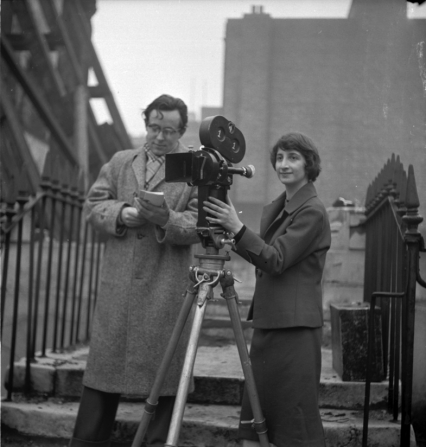
David Grieco ricorda che la vita di Lorenza è raccontata nel libro Il cielo cade, scritto quando, dopo l’esordio londinese con il cinema, Lorenza decide di tornare in Italia. La casa che divide con il nuovo compagno Bruno Grieco, padre di Davide, si apre ai registi e agli intellettuali dell’epoca. Qui “transitava tutto il cinema europeo in modo abbastanza casuale. Secondo uno strano e tacito accordo, tutti pensavano che Lorenza sarebbe tornata dietro la macchina da presa e venivano a passare le vacanze da noi. Lindsay Anderson diventò una specie di mio zio, Malcom McDowell diventò il fratello che non avevo essendo figlio unico, e con lui feci anche dei film.”
Quella casa era un luogo di libertà senza inviti né orari, un confessionale dove si incontrava gente e nascevano progetti. “La grande attrazione della casa era il tavolo da ping pong e la gente più improbabile si sfidava: Rod Steiger arrivava a mezzanotte con le palline e si cominciava. Un altro che frequentava spesso la casa era Gianmaria Volonté, all’epoca in una situazione difficile e con molti debiti. Un giorno ci dice: ‘Sto facendo un western con quel matto di Sergio Leone. Non me ne frega niente, ma mi servono i soldi e l’unica cosa di cui sono certo è che non lo vedranno mai…’ Il film era Per un pugno di dollari! Ecco, Lorenza mi ha regalato questa adolescenza qui, con tutti i danni che sono arrivati dopo.”
A Lorenza Mezzetti quest’anno il Torino Film Festival assegna il premio Maria Adriana Prolo, mentre Francesco Frisari e Steve Della Casa stanno realizzando il documentario Perché sono un genio. Sarà pronto la primavera prossima, racconterà la vita dell’artista e il modo in cui Lorenza è riuscita ad attraversare i momenti più importanti del Novecento con la sua personalissima dose di forza e fragilità. La rivista “Mondo Niovo” diretta da Caterina Taricano ha dedicato un intero numero alla Mazzetti, la quale ha dichiarato: “Mi sembra incredibile apparire sulla copertina di una rivista. Devo dire che però un po’ me lo aspettavo, essendo un genio.”
